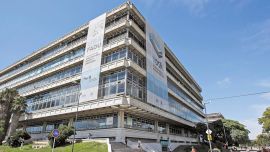Insect repellent has become a hot commodity in Argentina, which is besieged by dengue-carrying mosquitoes and facing shortages that have sparked supermarket brawls, rations and homemade concoctions.
The country is one of the worst hit by an outbreak of dengue sweeping Latin America and the Caribbean, attributed to a muggy summer that has been intensified by the El Niño climate phenomenon.
The outbreak in the middle of an economic crisis, in a country with strict import controls, has led to a severe shortage of mosquito repellents.
Some businesses have opened dedicated WhatsApp channels to tell clients when they get some in. Others impose rations of three products per person. Families often split up in line, so they can buy nine or 12 units at a time.
In one viral video, a man appears in a park surrounded by a cloud of mosquitoes, explaining how a mixture of water and low-cost local shampoo brand Plusbelle repels the flying pests.
"I did everything homemade," said Laura Di Costa, 56, who was unable to find repellent and ended up in the hospital with dengue, which causes joint and bone pain, earning it the nickname "breakbone fever."
Dengue can provoke haemorrhagic fever in severe cases, and death. It is transmitted by Aedes aegypti, a mosquito that coexists with another, Aedes Albifasciatus, which has been invading the capital and its surroundings since January.
"I try not to go out much, I don't take my grandchildren to the park so as not to be in the grass," added Di Costa.
With at least 129 deaths so far this year, Argentina has seen a 10-fold increase compared to the same period last year, according to official figures.
Brazil has seen an 81 percent increase in cases, the biggest in the region, according to the Pan American Health Organization, which has recorded 3.5 million cases – triple what was seen in 2023.
"Probably this will be the worst dengue season [in the region]," said Jarbas Barbosa, director of the Pan American Health Organization.
After facing criticism from the opposition for its "absence" amid the crisis, Libertarian President Javier Milei's government this week removed importation taxes on mosquito repellents for 30 days, in the hope that the market will self-regulate.
In the meantime, sprays and creams are selling for e-commerce site MercadoLibre for around US$40 apiece, rather than the usual US$5, a painful sum for a population already dealing with annual inflation of 276 percent and a deep economic crisis.
Many compare the shortages to those seen during the Covid-19 pandemic, when the prices of some products went through the roof.
"If I had known this was the situation, I would have brought back several bottles from Florida," lamented Ann Brody, a 51-year-old US citizen who has lived in Buenos Aires for more than 20 years and has just returned from a trip north.
"When the Covid [pandemic] started, there was a shortage of alcohol hand gel for a few days, but the lack of repellent has been going on for months,” she said.
The government has been criticised by the opposition for its refusal to introduce an existing dengue vaccine – made by Japan's Qdengam, which requires two doses for the equivalent of about US$140 – into the national vaccination calendar.
Health Minister Mario Russo told the TN news channel on Thursday that he would not submit to "pressure from laboratories," since although "it is safe and effective," it is still experimental and "is not a tool to mitigate the outbreak.”
"The [political] caste has a timeframe, the media has a timeframe that science does not have," he said, echoing the rhetoric of President Milei.


























Comments